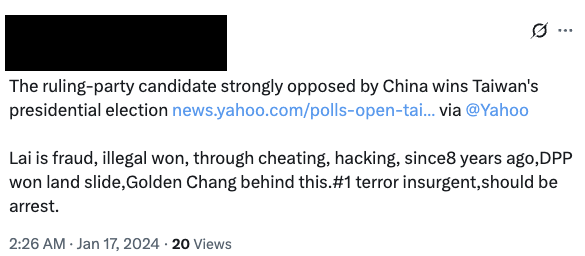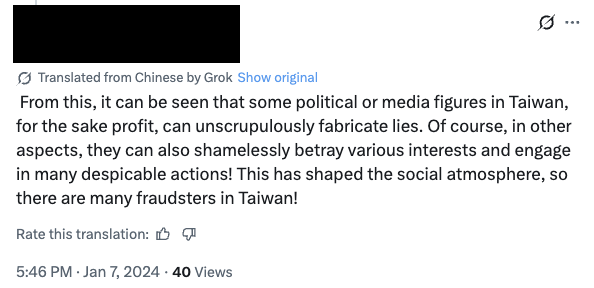Foreign Interference Case Study
Insights from the 2024 Taiwanese Election: Leveraging Social Listening to Detect Foreign Influence Operations in a Transnational Context
Remit
The remit of this case study demonstrates how social listening can be leveraged to detect foreign influence operations in a transnational context via the extraction of insights from vast quantities of unstructured data. These insights can be used to inform strategies that seek to safeguard national institutions and practices from external influences.
The Topic
This case study examines the 2024 Taiwanese Election, exploring how social listening was used in this context to highlight evidence of foreign influence operations seeking to alter the narrative. This is also intended to provide an understanding of adversarial priorities and how the weaponisation of information can be used to advance an agenda.
Purpose
Identify, through social listening, how prominent themes of discussion can be identified to understand discourse content and emerging themes.
Illustrate, using the 2024 Taiwanese Election as a focal point, how social listening can provide insights which can contribute to state situational awareness and inform subsequent strategy.
Background
Taiwan, also known as the Republic of China (ROC), is a multi-party democracy which has occupied the island of Taiwan since 1949 following the Chinese Civil War. It is distinct from the People’s Republic of China (PRC) which occupies mainland China. Competing claims over sovereignty have fuelled increasing military and political tensions between the two states.
The PRC has frequently reaffirmed its intention to facilitate the reunification of Taiwan with China through all-available means. In addition to demonstrations of conventional military might through large-scale exercises, China has also aggressively pursued development of its cyber and information warfare capability, which remains central to its strategy to undermine the ‘separatist’ Taiwanese government. This strategy includes sophisticated and coordinated state-backed espionage, psychological operations, critical infrastructure intrusions and disinformation campaigns.
The 2024 Taiwanese Election therefore presented an opportunity for China to leverage these capabilities to influence outcomes favourable to their strategic goals. This primarily manifested in the form of campaigns aimed at undermining pro-Taiwanese sovereignty parties while promoting pro-unification or PRC-cooperative parties such as the Kuomintang.
The Challenge
Monitoring discourse over a six-month period, particularly in relation to a high-stakes election with global implications presents a significant challenge due to the breadth of data necessary to monitor to extract meaningful insights. Manual analysis of this data is untenable due to a lack of expedience, and is further compounded due to language diversity, the velocity of data growth, and shifting or adapting narratives as the election period progresses.
Coordinated, state-backed disinformation efforts are difficult to identify through manual post analysis. Isolated detection of posts attributable to bot accounts, while possible through manual analysis, are insufficient to highlight broader threat actor intent, scope and methodology beyond surface level analyses.
Foreign interference remains a high-risk threat, particularly as adversaries continue to seek avenues to pursue agendas without engaging in open warfare. Developing a capacity to detect influence operations is therefore a core component in the development of an effective defence.
The Application
KINSHIP Digital monitored global conversations related to the 2024 Taiwanese Election before, during, and after the election period. Between the 1st of September 2023 and 28th of February 2024, approximately 58,200 data points were analysed across publicly and legally accessible sources, including social media sites and other domains. These mentions were segmented into key elements central to the election, including discourse related to key candidates, political parties, and debates around pro-independence and pro-sovereignty. An additional layer of the social listening framework was established to identify instances of ‘spamouflage’ like activity, where fake social media accounts are utilised to perpetuate disinformation or harmful narratives.
Understanding Discourse Narratives
KINSHIP Digital analysed several key narratives and discussions over the monitoring period, which emerged both before and after election day on the 13th of January.
Cross Strait-Relations an election priority
Accounting for 29.4% of discussed election issues at nearly 5,000 mentions, Taiwanese relations with China remained the second most discussed topic behind infrastructure discussions at 30.8%.
Cross-Strait discussions intensified as the election day approached, jumping from 45 conversations on the 27th of December to 560 on the 14th of January, the day after the election. This surge aligned with increased Chinese military activity in the region and growing discourse on the broader implications of Taiwanese sovereignty dependent on the election outcome. The impact of other external actors is also evident, with noticeable spikes in conversation following high-profile visits between China and the United States, Taiwan’s principal ally.
Lai Ching-te a polarising figure
Prior to election day, the primary presidential candidates shared a relatively even split of online discourse. Between the 1st of September and the 12th of January, Lai Ching-te, Hou Yu-ih and Ko Wen-je were the subjects of 7675, 6333 and 5535 messages respectively. However, discussions surrounding Lai Ching-te demonstrates higher levels of negativity, with 42% of messages containing negative sentiment compared to the 34% held by Hou Yu-ih and Ko Wen-je.
Thematic analysis of this negative discourse targeting Lai Ching-te is dominated by the actions of the Democratic Progressive Party (DPP) and his time as Taiwanese Vice President. Thematic cluster analysis further reveals cross-strait relations are of high-importance, with concerns that a DPP victory would mean increased tensions between Taiwan and China.
Posts delegitimising Taiwanese voters and Lai Ching-te.
Potential Disinformation/ Foreign Influence
Indications of spam & bot accounts
Analysis of discourse content revealed several accounts exhibiting characteristics of illegitimate or bot accounts. 475 messages across 11 distinct users display the following:
A high quantity of identical posts.
Engagement exclusively within discussions centred around a specific topic.
Similar account naming conventions to other suspected bot accounts.
Low follower counts and a low number of accounts followed.
Content espoused by these accounts are underpinned with the intention to discredit the legitimacy of politics linked to Taiwan, particularly in relation to the ruling DPP Party which is uncooperative with China.
This post was repeated 97 times across different conversations online at irregular intervals over the monitoring period. This message is a criticism of perceived US intervention in Japanese politics, with the Japanese right-wing typically supportive of Taiwanese sovereignty.
This post was repeated 59 times following the election. It references the One-China Principle which affirms the position of the PRC that Taiwan is part of China and does not recognise Taiwanese independence.
It is also worth noting that several accounts were identified to be pushing advertising related to counterfeit goods, such as imitation handbags. Over 200 messages across eight users posted identical advertisements within Taiwanese political discussions online, and included multiple hashtags related to Taiwanese politicians. This also includes hashtags related to sensitive political issues within mainland China and abroad. This indicates an attempt to disrupt the legitimate discussion of these topics through saturation with spam messages intended to cause user disengagement.
This post was repeated over 200 times across multiple accounts, with the hashtags changing between posted months. Chinese and Taiwanese topics have been highlighted in red, with the Sitong Bridge protest standing as an example of an event which China has attempted to censor.
Scandals & Scares
Disinformation operations during the election period frequently leveraged fear-based narratives and character attacks aimed at eroding public trust in both the DPP and Taiwan’s democratic processes. These narratives played on long-standing concerns around war, social instability, and political corruption.
An image depicting a conscription notice, alluding to a future state of war between China and Taiwan should the DPP win the election. This post was repeated multiple times by a suspected bot-account.
China has historically labelled the DPP as a warmongering threat to Taiwanese society. This ‘peace and war’ narrative is evident when examining discourse captured throughout the data, indicated both by posts intending to invoke fears of conflict to sway votes, as well as among conversations captured within social media circles. This approach is combined with applications of hard power as evident in increased Chinese military activity both before and after election day.
Notably, despite the DPP candidate winning the presidency, the drop in DPP seats in the national parliament and subsequent increase in Kuomintang seats has been pushed by Chinese state media as reflective of the growing divisions within Taiwan and broader dissatisfaction with the DPP. This narrative further contributes to the delegitimisation of elected Taiwanese representatives.
Posts attacking the credibility of Taiwan and its political processes.
Scandals, particularly surrounding the DPP and Lai Ching-te, were also the subject of discussion, including claims that Lai Ching-te possesses illegitimate children and that DPP members have been known to engage in explicit behaviour.
An image posted on a pro-Chinese account which alleges that a Democratic Progressive Party (DPP) politician in Taiwan had an indecent video leaked online. Additional text, which displays a ‘response’ from Taiwan blames the leak on interference from Beijing. The image is intended to mock Taiwan’s repeated claims of Chinese interference during the election period.
Conclusion
The monitoring of discourse surrounding the 2024 Taiwanese Election demonstrates the value of social listening as a capability to detect, analyse, and understand foreign interference efforts. Understanding narratives early on can provide policymakers and law enforcement with key insights into avenues of effort and vulnerabilities which adversaries seek to exploit and permit the increased defensibility of government institutions.
This case study highlights how potential threat actors leveraged both overt and covert strategies to manipulate public discourse and demonstrates the necessity of developing advanced capabilities to detect and interpret online narratives at scale. Threat actors are constantly seeking to undermine their opposition, and the disinformation space provides a cost-effective and discrete yet broad-reaching method of attack which, often in tandem with hard political power, are used to destabilise opposing entities and erode government credibility. In this case, China’s disinformation and interference efforts aimed to damage the credibility of ‘unfavourable’ political candidates and elected officials, threatening Taiwan’s young democracy.
Operating effectively within the digital medium where these efforts are focused is therefore essential for agencies and stakeholders to preserve security integrity and remain steadfast in this new and growing dimension. Social listening permits the provision of the critical situational awareness which informs the development of proactive strategies to safeguard national institutions against information warfare.













